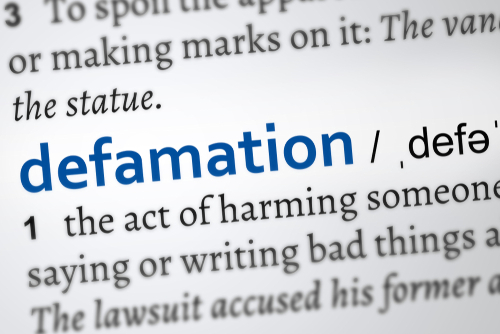State supreme court rules against attorney who alleged defamation and forced resignation from firm

Image from Shutterstock.
A Delaware attorney has lost his appeal in a case involving claims that he was defamed and forced to resign from his law firm.
“This appeal presents difficult questions concerning the actionability of speech that is defamatory—that is, injurious to a person’s reputation—but that is defended on the ground that it is an expression of opinion and not of fact,” wrote the Delaware Supreme Court in its opinion Tuesday. “We are asked to decide whether the First Amendment bars claims for defamation and tortious interference with contract against a defendant who, in an email to a law firm, described as ‘shockingly racist’ a lawsuit filed by one of the firm’s partners in his personal capacity.”
Scott Cousins, who worked at the Bayard law firm in Wilmington, Delaware, but lived in Pennsylvania, filed a complaint in August 2020 against the Unionville-Chadds Ford School District in Pennsylvania to prevent the retirement of its high school’s American Indian mascot, according to the opinion. Shortly after Cousins filed the suit, Rosemary Goodier—another Delaware attorney and a Pennsylvania resident—emailed Cousins’ employer a link to a news article on the case and said it “reflects poorly” on the firm.
Goodier also wrote in the email that “we hope you can reflect upon how shockingly racist and tone deaf this suit is. … Our tax dollars and administrative resources will be plunged into countering some shockingly racist statements by Mr. Cousins about protecting his white, Christian heritage,” the opinion said.
The president of Bayard subsequently asked Cousins to resign, telling him that the firm had suffered negative consequences as a result of the suit, according to the opinion. Cousins sued Goodier, but last year, a superior court judge dismissed the case after finding that Goodier’s accusations were opinion.
“It cannot be denied America is in the midst of an ongoing national debate about what it means to be racist,” the Delaware Supreme Court said in affirming the lower court.
“To be sure, there is nearly universal agreement that some behaviors are racist: These include the use of racial slurs, the practicing of overt racial discrimination, and the commission of racially motivated violence,” the opinion said. “But when a wider net is cast, this consensus quickly vanishes: It is clear to us that Americans disagree about a long and growing list of things that to some are racist and to others are not.
“It is not our role here to enter into this debate and decide who is right and who is wrong. In fact, we think that the First Amendment is clear that doing so would be the opposite of our role. It suffices that we conclude that Goodier’s statements, on their face, cannot reasonably be interpreted as stating actual facts.”
The Associated Press reported on the decision.



